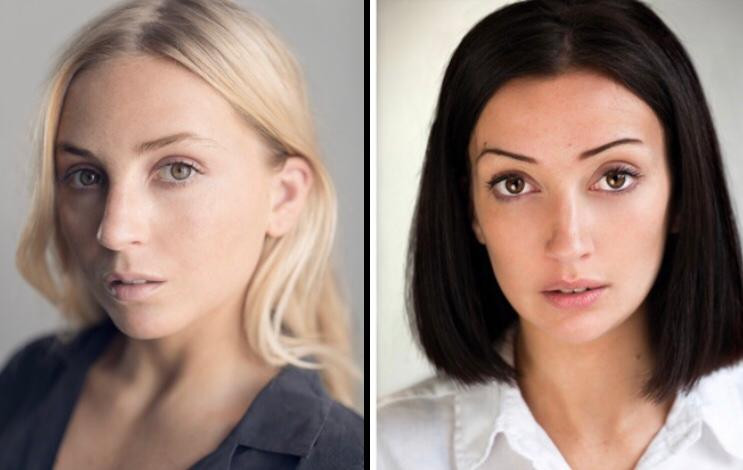
I Got Banned From the U.S. When Airport Security Found My Coke Texts
June 20, 2019VICE U.K. originally published this article.
Isabella "Issy" Brazier-Jones and Olivia Cura had always wanted to travel the US together. When their acting careers hadn’t gone as well as planned after drama school, they booked the trip hoping to spend a few months enjoying what the country had to offer. However, issues arose at border control. After hours of interrogation, Brazier-Jones was refused entry to the U.S. for allegedly having texts that referenced cocaine on her phone. She is now banned for 10 years. Here, she tells VICE her story.
Olivia and I have been best friends since we first went to drama school. You know when you just click and meet your soulmate?
After we graduated, we had quite a difficult time getting back into the industry, so we both sidelined acting and got on with life for a couple of years. Before we knew it, we'd slid back into a life we didn't want and reality was getting quite intense. So we decided, as London was really getting us down, that we would come back with a plan—to get out of the country for a couple of months and reboot ourselves. It was the perfect time to go to America because we'd always talked about it.
We quit our jobs and booked our flights there and back. We booked everything about a month before. The plan was to go to LA for a month then New York for a month and do half and half. The whole basis of the trip was going for a fun adventure, somewhere where we were also intrigued about the culture, and to see if we liked it there.
On the day of our flight, we were both super nervous about it. I think we were worried about packing up our lives and quitting our jobs, but also excited.
That day, I went and met Olivia at her parents' house at about seven in the morning, and then her mom drove us to the airport. We said our teary goodbyes and got on the plane. We just giggled for the whole plane journey.

When we landed, I felt really nervous about going through passport control because I just know what American passport control is like. I have a clip of Olivia filming me on her phone when we landed, expecting me to be excited, but I’m just really nervous.
By the time we got to L.A. it was 5:30 in the evening. When we got to passport control, I got placed with quite a stern man who asked all the generic questions like, "How long are you staying here?," "What's the purpose of your trip?," and "Where are you staying tonight?" Then they started asking about my money, and how much money I had in my bank account. I told him how much money I had and he didn't like it. He thought it was too low. I think that's what kind of took me to be questioned further. It was just a bombardment of questions that you weren't ready to answer.
Immediately, you are very struck by how intimidating it is. He then confiscated my phone and my passport while I was in the public border control, and signaled to his partner where Olivia was—[he] did the same to her. We were then escorted separately into the deportation center—a waiting room with plastic chairs and a guard at the door, where we were both told not to sit next to each other and not look at each other.
The waiting room itself is just a really intense atmosphere. People were coming in and out constantly. You have people there who are trying there hardest not to fall asleep. There was an Asian family that were there with their crying three-year-old son, who was being shouted at to shut up. I was just confused. I couldn't see how this was going to go any further than just being an honest mistake. I was just thinking that this was a routine check, that this will be done with soon, and we'll get a margarita in our hands and look back and think that was a crazy experience.
But it changed very quickly from that aspect of hope when Olivia's name got called out but not mine. I thought, thank God it's over, and then my name didn’t get called out. That was the last time I saw her until I got back on the plane.
That's when it spiraled. When she left, that's when the panic was really intense. I didn't want to be separated. I kept asking the officers if they could let my friend know what was happening, but every question you ask you're just told to shut up and sit down. "I told you, ma'am, shut up and sit down."
My memory of going into the interrogation is a real blur. By this point, I was incredibly exhausted. I was interrogated repeatedly, eight times over 24 hours. There was a lot of repetition, trying to press me into a corner. Up until the last interrogation, it was all about work and about whether I was going to be working there.
After that, they told me they were going to search my phone which was already confiscated. They brought up emails from five years ago—it was almost laughable. I got taken into a holding cell and was interrogated a couple more times after that. I then waited five hours where they looked through my phone for a second time.
I was totally delirious by the last round of interrogation because you're not sleeping, and they haven't fed you. All of a sudden, it's all about drugs. They said to me, "You've got to own up now. Stop bullshitting, stop wasting our time. We know you're a liar. We don't like people like you in our country."
They told me that they’d found a reference to cocaine on my phone. I asked what the reference was and they just refused to tell me. They just asked me whether I'd taken cocaine, and by that point, I didn't want to lie, so said: "Yeah, I've tried it before." That's how I got deported because of a reference they said was from two years ago.
I don't know what text it was, and when I got back I just deleted everything off my phone. I've got a lot of people I know in recovery, including family, so I wondered if it was that. There have been references in texts after a night out from friends asking me if I “took coke last night.” I don't think I even replied! It's a really hard thing because you live in London, and it just becomes part of your vocabulary.
By that point, I thought, I'm never coming back here again. I just don't want to be here anymore. I was escorted through the airport and onto the plane and didn't get my passport back until I landed. When I saw Olivia, it was the best feeling ever. We just laughed.
Now, I'm not allowed to return for ten years. They said I was an official felon, they even gave me a stamp on my passport.
I don't feel great now that I'm back. When I got returned, I was a bit scared to go into the world again. I'm an incredibly privileged person, and I try not to take that for granted where possible, but it sometimes can make you naturally naive to what's going on and to what other people are feeling. After this, I really got a tiny taste of what is going on at the moment.
When approached for comment, U.S. Customs & Border Control told VICE U.K. that it did not comment on individual cases.
Sign up for our newsletter to get the best of VICE delivered to your inbox daily.


